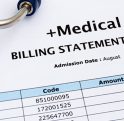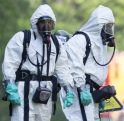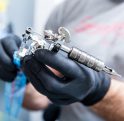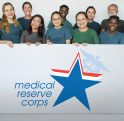Safe Ink – Safe Tattoos, Dangerous Tattoos and the Law
Posted March 9, 2017 by Michael Hokanson
How familiar are you with laws, rules and regulations surrounding body art and the people operate outside these rules?
The increase in the popularity of tattoos and the recent local news articles about under-aged minors receiving tattoos from unlicensed and unregulated persons prompts a response from your local health department. Tattoos can be beautiful expressions of motivation, art or inspiration that can last a lifetime. Local artists take great pride in a finished product that both parties can proudly show off. Each one of NCHD’s 13 County Health Department Environmental Health staff conducts inspections of each facility to ensure that each piece of equipment is sanitized according to rules and regulations, that the facility is clean and safe and that artists are properly trained in first aid, blood-borne pathogens, cross-contamination, and other related health concerns. In addition, each artist will give you information on cleaning, protecting and aftercare of your new tattoo. This will ensure your new artwork is safe and will heal quickly to be ready for display.
However, there are unlicensed and uninspected artists, known as “scratchers,” who operate and tattoo from unregulated locations like out of cars, at flea markets, in their home or even at your own home. Licensed, professional tattoo artists operating from inspected facilities know the value of a disinfected environment and sterile equipment. Scratchers give legitimate tattoo artists a bad reputation. Scratchers’ services are usually low-cost, but the quality is usually lower and the risk of encountering health hazards is much higher. Scratchers usually have no professional training, their equipment can be of poor quality and their place of operation can be an unsafe environment, increasing risk of cross contamination from unsafe practices. Additionally, if you have a problem with your tattoo or if you get an infection, then the scratcher is usually long gone or denies that they tattooed anyone. Think of it this way, you would not let a doctor come to your house to perform a surgery on you at your kitchen table, why should you let a tattoo artist do the same?
Now that you know where to go for a tattoo, it is important to be aware of the dangers of getting a tattoo. Anytime you are breaking the skin, you are running the risk of an infection. Unsterile needles and equipment can transmit infectious diseases such as HIV, hepatitis, staph and other bacteria. Keloid, or scar tissue, formation is another risked involved with getting a tattoo. These can be unsightly and be very hard to remove entirely.
The choice of ink used for a tattoo can cause problems as well. There is a risk of allergic reactions to the ink used; this may not while receiving the tattoo, but could show up later. Metal-based inks can react with MRIs (magnetic resonance imaging) and patients may suffer swelling or burning of the tattoo area. These instances are rare, but patients need to inform the radiologist prior to the procedure. Finally, if you decide you do not want the tattoo, removal can be costly, painful and some tattoos simply cannot be erased.
What does the law allow? Can anyone get a tattoo? It is a violation of state law for anyone under the age of 18 to receive a tattoo regardless of parents’ permission. It is also a violation for anyone to tattoo within one inch of the eye socket unless the person doing the tattoo is a physician. Nipple and genital piercing of a minor is also prohibited. Report any violations to your local law enforcement immediately.
In closing, if you want a tattoo and understand the risk, please choose a reputable, licensed and inspected tattoo studio. Look for the Department of Public Health permit and inspection form, which is posted clearly inside the studio. Ask questions of the artist and check out their artwork. Above all – avoid the “scratchers”!
For more information regarding tattoo rules and regulations, contact your county’s environmental health department.
Follow us on Facebook, Twitter and Instagram to receive news, emergency messages and health information!


 Contact Us
Contact Us Locations
Locations Job Openings at North Central Health District
Job Openings at North Central Health District Internships
Internships Board of Health
Board of Health Cost and Insurance
Cost and Insurance Privacy Policy
Privacy Policy Teens & Adults
Teens & Adults For Children
For Children Other Programs
Other Programs County Environmental Health Offices
County Environmental Health Offices Chemical Hazards
Chemical Hazards Tourist Accommodations
Tourist Accommodations Food Service
Food Service Rabies Control
Rabies Control Lead Poisoning Prevention
Lead Poisoning Prevention Body Art
Body Art Land Use
Land Use Swimming Pool Program
Swimming Pool Program Water Testing for Private Wells
Water Testing for Private Wells Environmental Health Complaints
Environmental Health Complaints Georgia Food Recall Alerts
Georgia Food Recall Alerts Personal & Family Preparedness
Personal & Family Preparedness Emergency Preparedness for Functional & Access Needs
Emergency Preparedness for Functional & Access Needs Severe Weather Preparedness
Severe Weather Preparedness Emergency Preparedness Training
Emergency Preparedness Training Medical Reserve Corps
Medical Reserve Corps Regional Healthcare Coalitions
Regional Healthcare Coalitions Strategic National Stockpile/Medical Countermeasures
Strategic National Stockpile/Medical Countermeasures